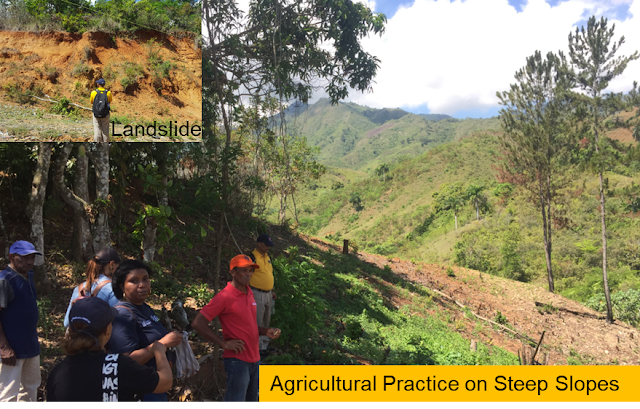Combating Soil Erosion in the Dominican Republic
"You never get satisfied in your paid job at the extent you can get as a volunteer because your effort can bring smiles on the faces of needy people"
When he landed in Santo Domingo, he enjoyed seeing the coastal city similar to his current hometown of Houston, Texas. Originally from Nepal, he was surprised to find a similar topography and terrain in the DR.
The overall objective of his F2F volunteer assignment was to increase the resilience of the vulnerable populations on the impacts of climate change and weather patterns. With a special focus on field training and education, the project uses a crosscutting approach on agricultural livelihoods in the Yaque del Norte, Atlantic, and Yana Camu watersheds. Farmer training was delivered to increase awareness and build capacity while promoting mitigation and adaptation strategies to control soil erosion and landslides on both steep slopes and flat terrains.
(Above) A typical landscape of the Seiba de Bone, Mao, community in the Dominican Republic
Soil erosion is a naturally occurring process that impacts farmers around the globe. Soil as a growing medium is used throughout agriculture production and often intensive agricultural practices can displace the soil and impact underlying structure and composition. This can cause serious problems when the soil is redeposited into rivers, lakes, coastal waters, and neighboring land changing the topography of a field, road, or region. Soil erosion can happen as a result of a mixture of severe rainfall and water runoff, traction from pebbles and boulders in rivers and streams, flooding, wind, mass displacement of rocks through landslides, climate change, human interaction, and lack of naturally occurring vegetative cover.
Ram Ray traveled to three unique communities (Seiba de Bone, Sonador de Yaroa, and Barranca), located in three different watersheds (Yaque del Norte, Atlantic, and Yana Camu), within three provinces (Santiago Rodriguez, Puerto Plata, and La Vega). He had the opportunity to observe the critical issues and challenges of the three communities. Most notably deforestation, continuous agricultural production on steep slopes, road cutting and unstable slopes, landslides, and flooding. He was able to study the major crops being grown in the region: cacao, mango, plantain, banana, black beans, green beans, and rice, that are being decimated by the soil erosion.
During his assignment he spent time meeting with local farmers, evaluating their production methods, and the impacts of soil erosion. He then conducted one-to-one training and presentations with the farmers and their communities. By providing information and resources on how to practice climate-smart agriculture the community is now equipped with knowledge and tools to implement preventative practices to mitigate the impacts of soil erosion, landslides, and flooding.
"Volunteers cannot do everything, but definitely can do something, and by doing something, it will definitely bring some difference in the community"
Ram Ray is confident his provided recommendations for the communities will bring positive change to farmers' outlook, use of preventative agricultural practices on sloped terrains, and financial security. By implementing his recommendations, communities will be able to help prevent soil erosion and landslides on the steep slopes and control the flooding on the flat terrain. Noting that intensive care is needed to maintain soil health and prevent long-term costs of soil erosion, Ram Ray's assignment provides sustainable applications for the regions.


.png)

Bonjours, je m'appelle Adil AKIL, je suis ingénieur agronome spécialisé en management des ressources en sols et en eaux, je suis intéressé par ce projet. Voici mon adresse mail : adiloakil2222@hotmail.com
ReplyDelete